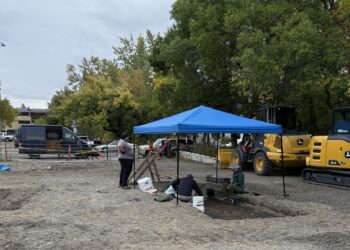Resort tax board to enforce penalties on delinquent taxes
By Sarah Gianelli EBS Senior Editor
BIG SKY – The Aug. 8 meeting of the Big Sky Resort Area District tax board opened with news from Tim Kent, branch manager of First Security Bank in Town Center, and member of the Big Sky Community Housing Trust advisory council.
With the $1.75 million in resort tax funding securely in a land bank, Kent announced that the housing trust, in partnership with HRDC, is close to finalizing the buy-sell agreement for the Meadowview property, which will be designated as a workforce housing development.
The Meadowview property is located northwest of the Big Sky Community Park and, in regards to this particular situation, a land bank holds funds specifically for the use of purchasing property on which workforce housing will be built.
The current owners of the property have continued development during the acquisition process, Kent said, so that when HRDC takes over the project, vertical construction can start immediately.
Kent also said that the HRDC’s Down Payment Assistance Program should be ready for application in Big Sky within 60 days. Housing trust advisory council member Britt Ide continues to spearhead creating a privately funded, Big Sky-specific program that is in the fundraising stages.
After lengthy discussion among the board with guidance from BSRAD legal counsel Betsy Griffing, procedural steps in response to delinquent resort tax collections were agreed upon. The board decided that when a remittance is 30 days late, a reminder letter will be sent; at 90 days, a notice of noncompliance; and at 120 days, a warning of legal action. If, after another 30 days, the delinquent party has not yet communicated with the resort tax board, an action will be filed in district court. This procedure will go into effect on Sept. 1.
Ever since Dan Clark, director of the MSU Local Government Center, recommended that the best self-governing option for Big Sky was to expand the role of the resort tax board, the board has cautiously circled the idea. Board members have expressed varying levels of caution, but have also shared a sense of not knowing how to approach it or where to begin exploring the idea.
“At the level of money we’re handling now, that money needs to be invested strategically,” said board secretary Steve Johnson. “This is no longer chump change from a cookie jar.”
Board director Mike Scholz stressed numerous times that “we want to be seen as an entity that is helping the community, not driving it.”
Scholz and Johnson were tasked with determining the initial steps in that direction. On Sept. 7, from 8 to 10 a.m. in the resort tax office in Town Center, the board will hear a presentation from Future West, a Bozeman-based nonprofit that assists communities with addressing growth and change in a way that will benefit and preserve their collective values and assets. The board will then decide if they want to consult with the firm moving forward.
Clark will be present for a discussion following Future West’s presentation from 10 a.m. to noon. All organizations and entities receiving resort tax funding are invited to attend both sessions.
During the rest of that afternoon, the board will prioritize action items for the coming year—one of which is deciding how to collect resort tax on items purchased online.
“What I hear from local retailers is that when the UPS driver opens the cargo door to make a delivery to them, they see a wall of packages from Amazon,” Johnson told EBS. “While they are collecting resort tax, Amazon is not, and they rightly question the fairness of it.”
A recent U.S. Supreme Court ruling that allowed South Dakota to require all e-commerce sites to collect sales tax regardless of whether they have a physical presence in the state, does work in the board’s favor; however, resort tax being a selective sales tax on “luxury items” complicates instituting a similar system for Big Sky.
“The basic decision was that we owe it to our local businesses who collect the resort tax to figure this out in terms of fair competition,” explained Johnson in an Aug. 15 email to EBS. “The details, including government support in pursuing this, need more work.”
Visit resorttax.org for more information about the delinquent collections protocol that goes into effect Sept. 1.













